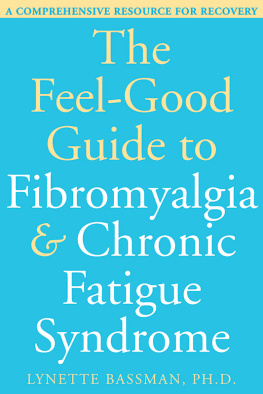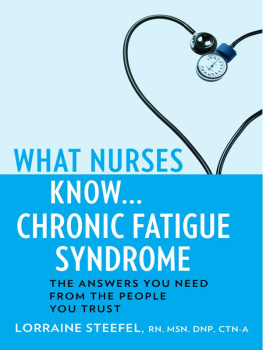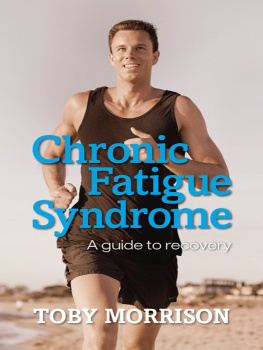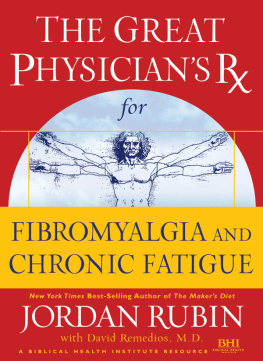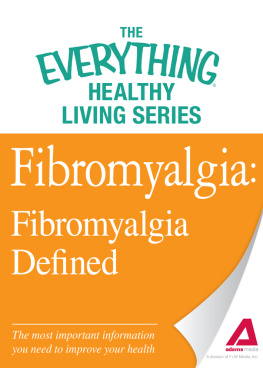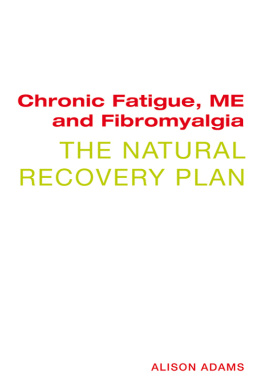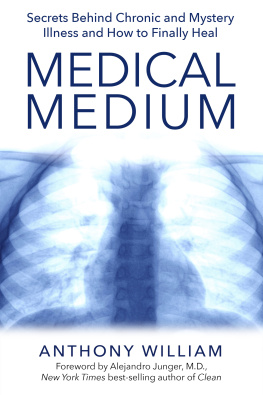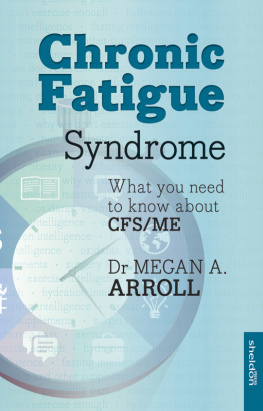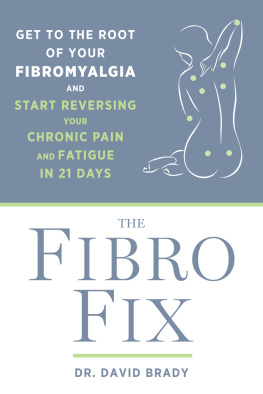Chapter 1
Is This Book About You?
What Are Fibromyalgia and Chronic Fatigue Syndrome?
Every day many things must happen in our bodies to maintain healthy, normal functioning. For most people, on most days, these processes go smoothly, without any thought. Sometimes something will go wrong with one of these processes; you might sprain an ankle, impairing your musculoskeletal functioning, or you might develop a stomachache, impairing your digestive functioning. Also, a problem in one system can set off problems in other systems. When this happens it can be hard to figure out whats going wrong.
With fibromyalgia (FM) and chronic fatigue syndrome (CFS), a larger number of basic body processes malfunctionand they dont get better for a long time. The bodies of people with FM and CFS do, however, malfunction in certain characteristic ways; a diagnosis of FM or CFS is based on these characteristic types of dysfunction.
Are CFS and FM the Same Disorder?
CFS and FM are very similar. Some people say they are the same illness. Some people, pointing to specific biological markers that differ between the two groups of patients, say they are different syndromessets of symptoms that may or may not have a common underlying mechanism. I believe the apparent differences are most likely due to the way the research on these syndromes has been carried out. When you take individuals, each with his or her own unique combination of symptoms, and compare them as groups you lose a lot of specific information. Individuals may seem more alike than they are and groups may seem more different.
Research on CFS grew out of the field of immunology; its early focus was on chronic infections, such as the Epstein-Barr virus, that were often seen in patients with CFS. Research on FM comes from the rheumatology field; its focus was primarily on the pain that people with FM experience. To some degree, the way these two syndromes are defined reflects these roots.
A diagnosis of CFS is based on fatigue and flu-like symptoms, while a diagnosis of FM requires a certain number of tender points on specific parts of your body. But most people with FM will tell you that they have fatigue and most people with CFS will tell you that they ache all over. Also, individual doctors may diagnose you with one or the other as a result of knowing more about that particular syndrome and being sensitized through their own training to focus on certain symptoms that fit their understanding of the illness.
Because FM often follows a physical trauma, such as an automobile accident, and CFS often follows an illness, such as mononucleosis or a severe flu, it may be that the terms FM and CFS are actually names for two subgroups of the same syndrome, triggered differently.
So, although its not clear yet whether these two syndromes are really the same illness, they have so many elements in common that, until new information comes to light that clearly differentiates between them, there is more reason to assume theyre the same than to assume theyre different.
Do You Have One of These Syndromes?
A diagnosis of FM or CFS is made by comparing your symptoms to a list of symptoms characteristic of the illness. The diagnostic criteria for both FM and CFS are works in progress; theyve been revised in the light of new information and will probably be revised again. Diagnosing a syndrome is different than diagnosing a disease, the criteria for which might include not just a list of symptoms but also a blood test or some other marker that distinguishes between those with the disease and those without it. So far, for FM and CFS theres no distinguishing marker. Unfortunately, some people make the mistake of thinking this means these illnesses arent real.
With any set of diagnostic criteria, there are typically people who meet all of the criteria, people who meet the minimum number of criteria, and some who fall just short of the criteria. On the other hand, there are many, many symptoms that dont appear in the criteria because whoever wrote the criteria didnt deem these symptoms representative of enough of the people with the illnesses. So, although diagnostic criteria are helpful, they shouldnt be regarded as any kind of ultimate truth.
If you dont meet the full criteria for FM or for CFS, but youre experiencing a lot of similar types of dysfunction, you may still find the information in this book helpful to you.
Diagnosis Step One: Ruling out Other Disorders
There are a variety of disorders that can masquerade as FM or CFS but require different treatment. FM and CFS can only be diagnosed when these other disorders have been ruled out. However, some people do have both one of these other illnesses and FM or CFS. Your MD will know what tests to run to rule these other disorders out:
- autoimmune disease
- cancer
- early Parkinsons disease
- eating disorders
- generalized osteoarthritis
- hepatitis
- hormonal disorders
- hypothyroidism
- lupus
- mitochondrial disease
- multiple sclerosis
- myofascial pain syndrome
- narcolepsy and other sleep disorders
- obesity
- osteomalacia
- polymyalgia rheumatica
- subacute infections
Diagnosis Step Two: Checking the Diagnostic Criteria
If, with the help of a health care professional, youve ruled out the above diagnoses, check the following two sets of criteria to see if your symptoms fit either diagnosis.
The American College of Rheumatology Criteria for Fibromyalgia (Wolfe et al. 1990)
- Pain must be present in eleven of eighteen specific points on the body when moderate pressure is applied. Pictures showing the locations of these points can be found on many FM Web sites. An examination of these tender points must be carefully carried out by a health professional who has training in the proper procedure.
- The pain must be in all four quadrants of the body, plus the cervical spine, anterior chest, thoracic spine, or lower back.
- The pain must have been present for at least three months.
CDC Revised Criteria for Chronic Fatigue Syndrome (Fukuda et al. 1994)
- Severe, unexplained, persistent chronic fatigue.
- Four or more of the following symptoms for six or more months, not predating the fatigue: substantial impairment in short-term memory or concentration; sore throat; tender lymph nodes; muscle pain; multijoint pain without swelling or redness; headaches of a new type, pattern, or severity; unrefreshing sleep; and postexertional malaise lasting more than twenty-four hours.
Diagnosis Step Three: Identifying Additional Symptoms
The following are some additional symptoms and co-occurring conditions that many people with FM and CFS experience (bear in mind that these can be symptoms of many other health conditions as well):
- abdominal pain
- alcohol intolerance
- anxiety and panic attacks
- bloating
- brain fog
- chronic cough
- depression
- diarrhea
- dizziness
- dry eyes or mouth
- dysmenorrhea
- earaches
- endometriosis
- esophageal dysmotility
- headache (migraine and other types)
- interstitial cystitis
- irregular heartbeat
- irritable bowel, colitis
- irritability
- jaw pain (TMJ)
- low-grade fever
- memory difficulties
- mitral valve prolapse
- nausea
- neurally mediated hypotension and fainting
- night sweats
- osteoporosis
- sensitivity to loud noises, bright lights, odors, drugs, and chemicals
- shortness of breath
- skin problems
- sleep disturbance
- tingling sensations
Is It All in Your Head?
Because depression and anxiety are common in people with FM and CFS, many uninformed people claim these illnesses dont really exist, that theyre all in your head. However, anxiety and depression appear to be just two of the many symptoms of these illnesses and theres no indication that either is the cause of the other symptoms. Also, its well established that the bodies of people with FM or CFS demonstrate very real, physical differences compared with healthy bodies.
Next page
